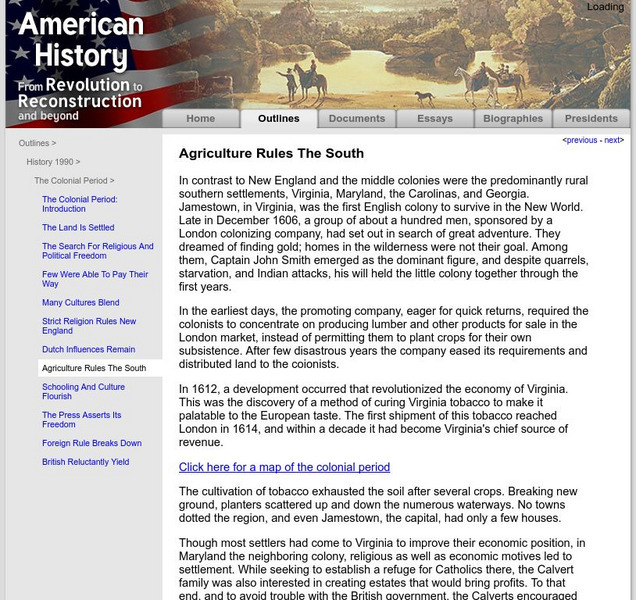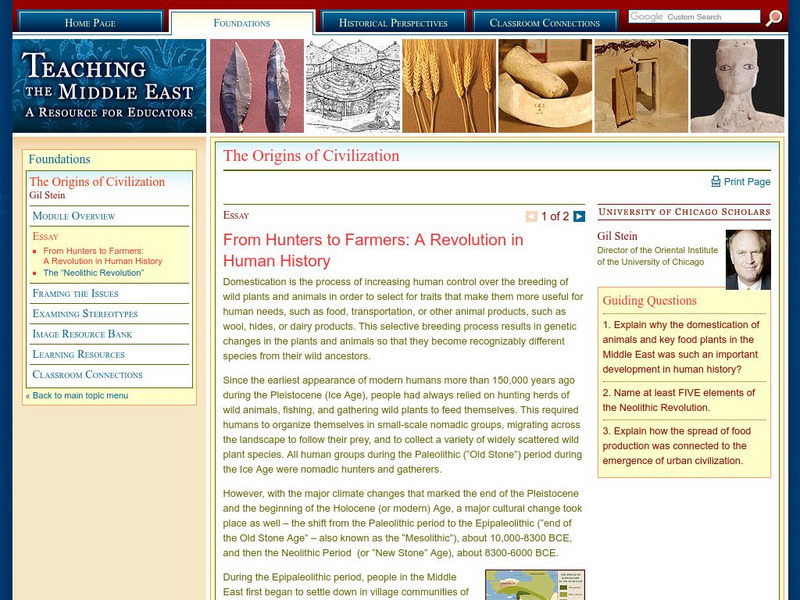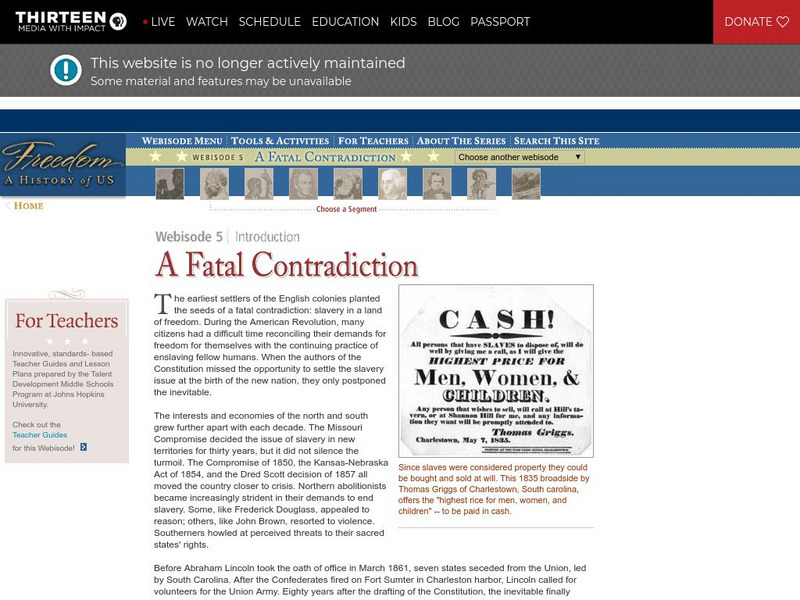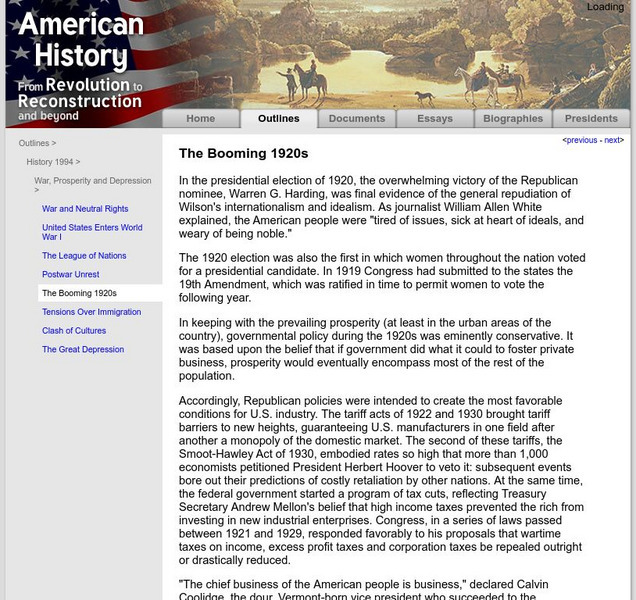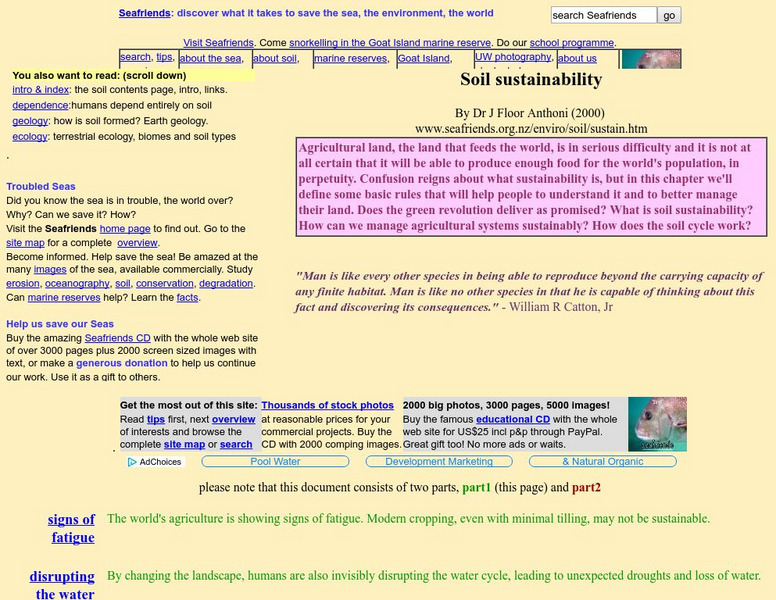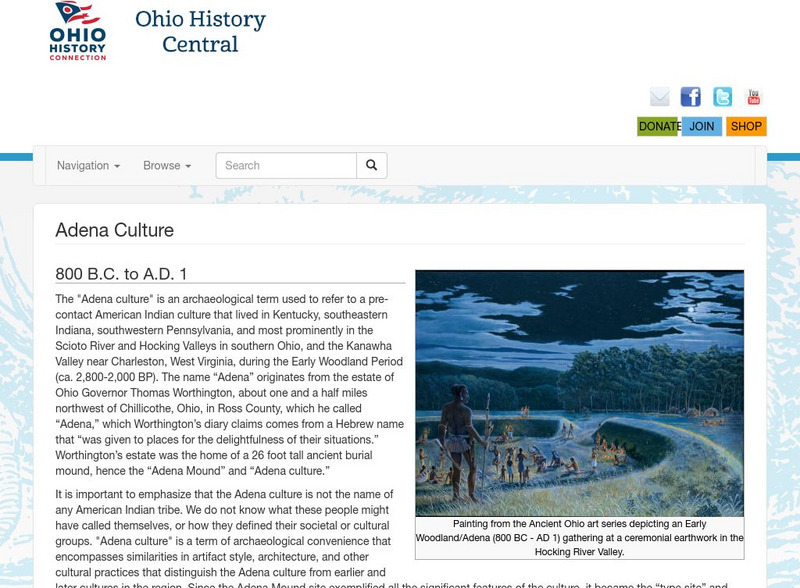Hi, what do you want to do?
University of Groningen
American History: Outlines: Agriculture Rules the South
The essay describes the devlopment of the Southern colonies as agricultural centers and the cultural aspects associated with rural, agricultural life.
University of Chicago
University of Chicago: Teach Middle East: Hunters to Farmers
An essay reviewing the history of the Neolithic Revolution where humans begin as nomadic hunters and gatherers and evolve into villages with domestic agriculture and animals.
Country Studies US
Country Studies: Revolution in Agriculture
This site describes how even though industry was expanding in the U.S., agriculture still remained the most important occupational sector in the US. As the population grew, farmers in the U.S. had to find ways to meet the explosive...
Oswego City School District
Regents Prep: Global History: Neolithic Revolution
The Neolithic Revolution created a shift in how people lived. Humans began settling down into villages and establishing methods of agriculture and domesticating animals to relinquish the need for nomadic lifestyles. Read a short summary...
Other
H2 G2: Neolithic Revolution: How Farming Changed the World
Peruse this article featuring the ways discoveries and establishments of agriculture, government, social class, etc. during the Neolithic Revolution altered the future for all civilization.
Massachusetts Institute of Technology
Mit: Inventor of the Week: Eli Whitney
This site from the MIT Invention Dimension provides the history of Eli Whitney's cotton gin. Important part of the Industrial Revolution.
Other
Science Magazine: Reading the Signs of Ancient Animal Domestication
An article which discusses the size of the first animals domesticated by humans about 10,000 years ago. The author reviewed a study in which it was suggested that size reduction evidence may not be the first sign of domestication....
University of Nebraska Omaha
Ec Ed Web: Virtual Economics Web Companion
The Virtual Economics Web Companion for K-12 economics and social studies teachers was created by the National Council on Economic Education. A wide variety of educational materials and lesson plans can be accessed through this site....
Khan Academy
Khan Academy: World History: Unit: Beginnings 600 Bce
This virtual course from Khan Academy is a series of video tutorials and practice links that follow the world's prehistory through 600 BCE.
Other
Seafriends: Soil Dependence
This website looks at our dependence on soil and what it produces. It includes text, graphs, charts, illustrations and important statistics. Hosted by the Seafriends Marine Conservation and Education Center.
American Academy of Achievement
Academy of Achievement: Norman E. Borlaug, ph.d.
A well-written biography of Norman E. Borlaug, a native of Iowa and an agricultural scientist. He worked throughout his life in the fight to end world hunger, winning the Nobel Peace Prize for this work. Includes a profile, interview and...
PBS
Wnet: Thirteen: Freedom: A History of Us: A Fatal Contradiction Webisode 5
Webisode 5 - A Fatal Contradiction. The history of the United States is presented in a series of webisodes, within each are a number of segments.Included are links to lesson plans, teacher guides, resources, activities, and tools.
University of Groningen
American History: Essays: Anglo Amer. Colonization in Texas: Food Production
Describes the role Texas played in trading food crops in the mid-1800s.
University of Groningen
American History: Outlines: Machines and Science Help Farmers
Interresting site from the University of Groningen explaining the incredible impact of machines and technology on developing resources and improving agriculture.
University of Groningen
American History: Outlines: Outline of American History: Booming 1920s
This brief article addresses many of the issues facing the country after World War I. It provides an overview of the Republican policies which supported private business.
University of Groningen
American History: Essays: Failure of West Indian Company Farming
Chronicles the begining of company farming in the United States and what led to its faliure. Click on "next" at the bottom of each page to get more of this essay. In-depth information.
Khan Academy
Khan Academy: Gallery: Civilization
Explore the images of this gallery and consider how increased productivity from the land, food surpluses, and swelling populations changed the types of communities that humans lived in.
Other
Seafriends: Soil Sustainability
Agricultural land, the land that feeds the world, is in serious difficulty and it is not at all certain that it will be able to produce enough food for the world's population, in perpetuity. Confusion reigns about what sustainability is,...
Independence Hall Association
U.s. History: Inventors and Inventions
The industrial revolution in America spawned the inventions of many inventors, who improved technology in many different areas. See how transportation, agriculture, and communications were transformed because of these inventions.
CommonLit
Common Lit: Text Sets: Workers' Rights
As America grew, so did its production of agriculture and manufacturing, leading to a rise in workers and their demands. Study the history of worker's rights in America from the Industrial Revolution to today. This collection includes 13...
Ohio History Central
Ohio History Central: Adena Culture
Read this brief, but informative description of the Adena culture and the change resulting in the people's turning to agriculture as a way of life.
University of Groningen
American History: Essays: Colonization in Texas: Cultivation of Cotton and Wheat
Discusses the cotton economy in the Lower and Upper South of Texas in the 1800s, and the role transportation played in its growth, or lack thereof in some regions. Wheat was more widely grown in the Upper South where the yeomen farmed.
Other
Cambridge University Press: Palm Oil
Describes the origins of, European demand for, and the devlopment of modern-day global trade of palm oil.
Curated OER
Wikipedia: Natl Historic Landmarks in South Carolina: Coker Experimental Farms
Site of crop-improvement experiments that "played a great role in the agricultural revolution of the South".





